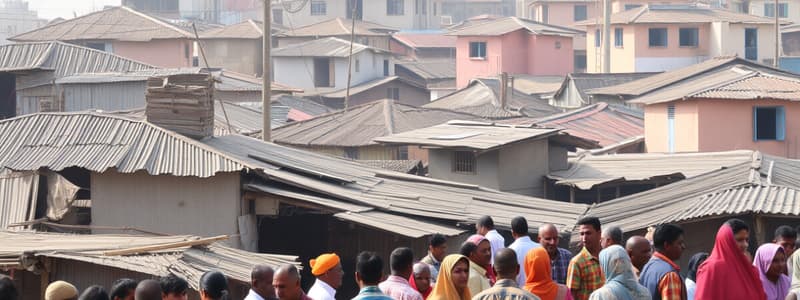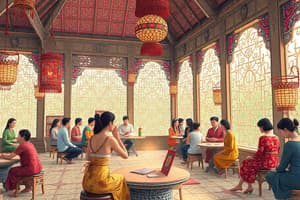Podcast
Questions and Answers
Cultural diversity refers to the existence of multiple cultural groups within a society.
Cultural diversity refers to the existence of multiple cultural groups within a society.
True (A)
Social institution is an informal group of people who do not provide structure to society.
Social institution is an informal group of people who do not provide structure to society.
False (B)
Symbols in culture can include objects, gestures, sounds, or images that represent ideas.
Symbols in culture can include objects, gestures, sounds, or images that represent ideas.
True (A)
Totalitarianism seeks to distribute power equally among all citizens.
Totalitarianism seeks to distribute power equally among all citizens.
Political ideologies such as liberalism and conservatism do not influence government structure.
Political ideologies such as liberalism and conservatism do not influence government structure.
Social stratification is the hierarchical layering of individuals based on wealth, power, and prestige.
Social stratification is the hierarchical layering of individuals based on wealth, power, and prestige.
Norms are random behaviors that do not guide actions or judgments.
Norms are random behaviors that do not guide actions or judgments.
The process of globalization contributes to cultural change.
The process of globalization contributes to cultural change.
Flashcards are hidden until you start studying
Study Notes
Culture
- Definition: The shared beliefs, values, customs, and behaviors of a group.
- Components:
- Symbols: Objects, gestures, sounds, or images that represent ideas or concepts.
- Language: A system of symbols that allow communication.
- Norms: Rules and expectations that guide behavior.
- Values: Deeply held principles that guide actions and judgments.
- Cultural Diversity: The existence of multiple cultural groups within a society.
- Cultural Change: Influences such as globalization, technology, and migration leading to shifts in culture.
Society
- Definition: A group of individuals living together in a defined area, sharing a culture.
- Structure:
- Social Institutions: Established systems that structure society (e.g., family, education, religion, economy, government).
- Social Stratification: Hierarchical layering of individuals or groups based on wealth, power, and prestige.
- Social Roles: Expectations and behaviors associated with an individual’s position in society.
- Social Interaction: The ways in which people relate to one another (e.g., cooperation, conflict, competition).
- Community: A smaller, localized group within society often sharing common interests and values.
Politics
- Definition: The process by which groups make collective decisions and the distribution of power and authority.
- Political Systems:
- Democracy: Government by the people, typically through elected representatives.
- Authoritarianism: Concentration of power in a single authority or a small group.
- Totalitarianism: An extreme form of authoritarianism that seeks to control all aspects of life.
- Political Ideologies:
- Liberalism: Emphasizes individual rights, equality, and democracy.
- Conservatism: Focuses on tradition, stability, and maintaining established social orders.
- Socialism: Advocates for social ownership and democratic control of the means of production.
- Political Culture: The set of attitudes, beliefs, and sentiments that shape the behavior and practices of a political community.
- Civic Engagement: Participation in political activities, including voting, activism, and community service.
Interconnections
- Culture and Society: Culture shapes societal norms and values, influencing social interactions and institutions.
- Society and Politics: Political structures are influenced by societal norms and values, reflecting the collective will of the people.
- Culture and Politics: Political ideologies and policies often stem from cultural values, impacting governance and public policy.
Culture
- Culture encompasses shared beliefs, values, customs, and behaviors that define a group.
- Symbols in culture include objects, gestures, and images that convey specific ideas and concepts.
- Language functions as a system of symbols, enabling communication and expression of thoughts.
- Norms establish rules and expectations that guide individual behavior within a cultural context.
- Values are deeply held principles that influence actions and shape judgments in a cultural group.
- Cultural diversity highlights the presence of multiple cultural groups within a single society.
- Cultural change can be driven by factors such as globalization, advancements in technology, and migration patterns.
Society
- Society is formed by a group of individuals coexisting in a defined area with a shared culture.
- Social institutions are established systems that structure societal life, including family, education, religion, economy, and government.
- Social stratification refers to the hierarchical organization of individuals or groups based on wealth, power, and prestige.
- Social roles define expectations and behaviors tied to an individual's position within society.
- Social interaction encompasses various ways people relate to each other, such as cooperation, conflict, and competition.
- Communities represent smaller groups within society, often bonded by common interests and values.
Politics
- Politics involves the processes through which groups make collective decisions and manage power distribution.
- Political systems include democracy, characterized by governance through elected representatives; authoritarianism, where power is concentrated in a single authority; and totalitarianism, which seeks to control all life aspects.
- Political ideologies reflect belief systems influencing governmental structures, with liberalism advocating for individual rights and democracy, conservatism focusing on tradition and stability, and socialism promoting social ownership.
- Political culture encompasses the attitudes and beliefs that inform the practices and behaviors of a political community.
- Civic engagement refers to participation in political processes, including voting, activism, and community service.
Interconnections
- Culture heavily influences societal norms and values, directly affecting social interactions and institutional structures.
- Political systems and policies are shaped by societal norms and reflect the collective will and values of the populace.
- Cultural values play a significant role in forming political ideologies and policies, impacting governance and public decision-making.
Studying That Suits You
Use AI to generate personalized quizzes and flashcards to suit your learning preferences.




